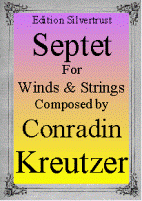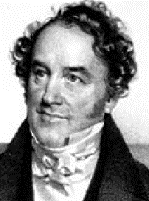Presents
Conradin Kreutzer
 |
 |
Septet in E flat Major, Op.62
For Violin, Viola Cello, Bass, Clarinet, Horn & Bassoon
Conradin Kreutzer (1780-1849) was born in the German town of Messkirch. He studied violin, clarinet, oboe, organ and piano as well voice as a young man. After briefly studying law in Freiburg, he went to Vienna where he studied composition with Albrechtsberger, one of Beethovenís teachers. He enjoyed a career as a composer and music director holding posts in Vienna, Stuttgart, Cologne and a number of other German cities. Today, if he is remembered at all, it is for his opera Der Nachtlager von Granada. However, in his time, his chamber music was highly thought of and often performed. He was a gifted melodist and his style is that of the late classical and early romantic era and in many ways resembles that of Carl Maria von Weber.
Though perhaps not the first, Beethovenís Op.20 Septet became the model for many composers who chose to write for such an ensemble. Kreutzerís Septet dates from 1822 and shares the same key, E flat, as well as the same instrumentation as Beethovenís Septet. The order of the movements are also similar. However, there the similarity ends. The character of the work is considerably different. For a start, it is clearly a product of the early romantic era whereas Beethovenís is entirely classical in style. It is in six movements: Adagio-Allegro, Adagio, Minuetto, Andante maestoso, Scherzo, and Allegro. The work begins with a chromatic, pregnant Adagio, which leads to a fresher Allegro with its easy to remember, lovely contrasting themes. Equal use is made of both the strings and winds. The Adagio features a fine cantilena episode between the cello and clarinet before the mood becomes more somber. A lusty Minuetto with gay trio comes next and is followed by a fleet Scherzo. The Septet concludes with a sprightly finale.
Septets are not assembled all that often. So when the Beethoven is played--what next? Certainly the Kreutzer is a fine answer. The part-writing is superb and the melodies appealing. Our edition is based on copies of the original found in London, Vienna and Stuttgart. Other septets for the same combination, which you may also wish to consider and which we publish are those by Adolphe Blanc, Franz Berwald and Mikhail Glinka (Click on their names to go to their webpages)
Parts: $44.95
Parts & Score: $69.95